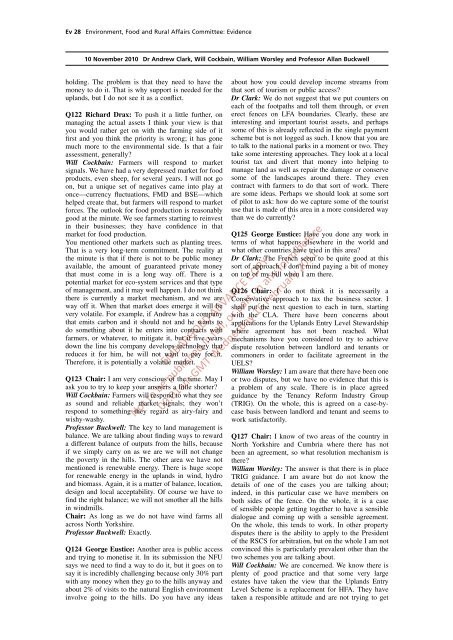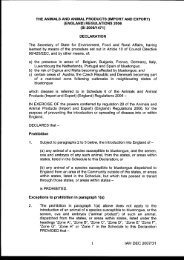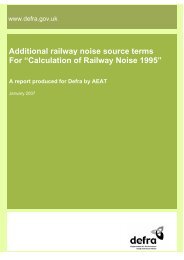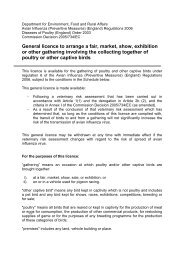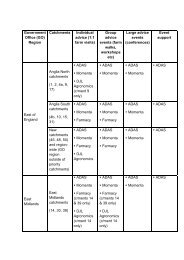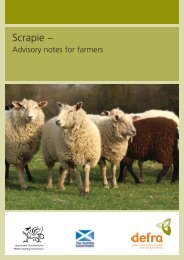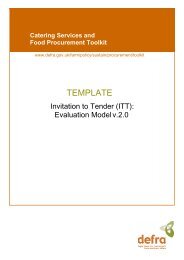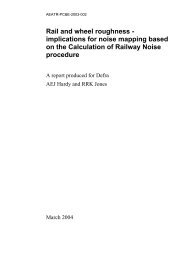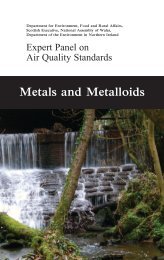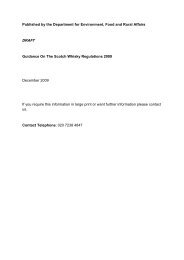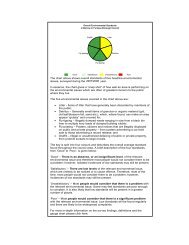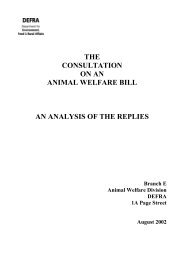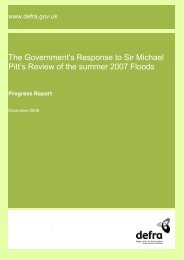Farming in the Uplands - ARCHIVE: Defra
Farming in the Uplands - ARCHIVE: Defra
Farming in the Uplands - ARCHIVE: Defra
You also want an ePaper? Increase the reach of your titles
YUMPU automatically turns print PDFs into web optimized ePapers that Google loves.
Ev 28 Environment, Food and Rural Affairs Committee: Evidence<br />
10 November 2010 Dr Andrew Clark, Will Cockba<strong>in</strong>, William Worsley and Professor Allan Buckwell<br />
hold<strong>in</strong>g. The problem is that <strong>the</strong>y need to have <strong>the</strong><br />
money to do it. That is why support is needed for <strong>the</strong><br />
uplands, but I do not see it as a conflict.<br />
Q122 Richard Drax: To push it a little fur<strong>the</strong>r, on<br />
manag<strong>in</strong>g <strong>the</strong> actual assets I th<strong>in</strong>k your view is that<br />
you would ra<strong>the</strong>r get on with <strong>the</strong> farm<strong>in</strong>g side of it<br />
first and you th<strong>in</strong>k <strong>the</strong> priority is wrong; it has gone<br />
much more to <strong>the</strong> environmental side. Is that a fair<br />
assessment, generally?<br />
Will Cockba<strong>in</strong>: Farmers will respond to market<br />
signals. We have had a very depressed market for food<br />
products, even sheep, for several years. I will not go<br />
on, but a unique set of negatives came <strong>in</strong>to play at<br />
once—currency fluctuations, FMD and BSE—which<br />
helped create that, but farmers will respond to market<br />
forces. The outlook for food production is reasonably<br />
good at <strong>the</strong> m<strong>in</strong>ute. We see farmers start<strong>in</strong>g to re<strong>in</strong>vest<br />
<strong>in</strong> <strong>the</strong>ir bus<strong>in</strong>esses; <strong>the</strong>y have confidence <strong>in</strong> that<br />
market for food production.<br />
You mentioned o<strong>the</strong>r markets such as plant<strong>in</strong>g trees.<br />
That is a very long-term commitment. The reality at<br />
<strong>the</strong> m<strong>in</strong>ute is that if <strong>the</strong>re is not to be public money<br />
available, <strong>the</strong> amount of guaranteed private money<br />
that must come <strong>in</strong> is a long way off. There is a<br />
potential market for eco-system services and that type<br />
of management, and it may well happen. I do not th<strong>in</strong>k<br />
<strong>the</strong>re is currently a market mechanism, and we are<br />
way off it. When that market does emerge it will be<br />
very volatile. For example, if Andrew has a company<br />
that emits carbon and it should not and he wants to<br />
do someth<strong>in</strong>g about it he enters <strong>in</strong>to contracts with<br />
farmers, or whatever, to mitigate it, but if five years<br />
down <strong>the</strong> l<strong>in</strong>e his company develops technology that<br />
reduces it for him, he will not want to pay for it.<br />
Therefore, it is potentially a volatile market.<br />
Q123 Chair: I am very conscious of <strong>the</strong> time. May I<br />
ask you to try to keep your answers a little shorter?<br />
Will Cockba<strong>in</strong>: Farmers will respond to what <strong>the</strong>y see<br />
as sound and reliable market signals; <strong>the</strong>y won’t<br />
respond to someth<strong>in</strong>g <strong>the</strong>y regard as airy-fairy and<br />
wishy-washy.<br />
Professor Buckwell: The key to land management is<br />
balance. We are talk<strong>in</strong>g about f<strong>in</strong>d<strong>in</strong>g ways to reward<br />
a different balance of outputs from <strong>the</strong> hills, because<br />
if we simply carry on as we are we will not change<br />
<strong>the</strong> poverty <strong>in</strong> <strong>the</strong> hills. The o<strong>the</strong>r area we have not<br />
mentioned is renewable energy. There is huge scope<br />
for renewable energy <strong>in</strong> <strong>the</strong> uplands <strong>in</strong> w<strong>in</strong>d, hydro<br />
and biomass. Aga<strong>in</strong>, it is a matter of balance, location,<br />
design and local acceptability. Of course we have to<br />
f<strong>in</strong>d <strong>the</strong> right balance; we will not smo<strong>the</strong>r all <strong>the</strong> hills<br />
<strong>in</strong> w<strong>in</strong>dmills.<br />
Chair: As long as we do not have w<strong>in</strong>d farms all<br />
across North Yorkshire.<br />
Professor Buckwell: Exactly.<br />
Q124 George Eustice: Ano<strong>the</strong>r area is public access<br />
and try<strong>in</strong>g to monetise it. In its submission <strong>the</strong> NFU<br />
says we need to f<strong>in</strong>d a way to do it, but it goes on to<br />
say it is <strong>in</strong>credibly challeng<strong>in</strong>g because only 30% part<br />
with any money when <strong>the</strong>y go to <strong>the</strong> hills anyway and<br />
about 2% of visits to <strong>the</strong> natural English environment<br />
<strong>in</strong>volve go<strong>in</strong>g to <strong>the</strong> hills. Do you have any ideas<br />
about how you could develop <strong>in</strong>come streams from<br />
that sort of tourism or public access?<br />
Dr Clark: We do not suggest that we put counters on<br />
each of <strong>the</strong> footpaths and toll <strong>the</strong>m through, or even<br />
erect fences on LFA boundaries. Clearly, <strong>the</strong>se are<br />
<strong>in</strong>terest<strong>in</strong>g and important tourist assets, and perhaps<br />
some of this is already reflected <strong>in</strong> <strong>the</strong> s<strong>in</strong>gle payment<br />
scheme but is not logged as such. I know that you are<br />
to talk to <strong>the</strong> national parks <strong>in</strong> a moment or two. They<br />
take some <strong>in</strong>terest<strong>in</strong>g approaches. They look at a local<br />
tourist tax and divert that money <strong>in</strong>to help<strong>in</strong>g to<br />
manage land as well as repair <strong>the</strong> damage or conserve<br />
some of <strong>the</strong> landscapes around <strong>the</strong>re. They even<br />
contract with farmers to do that sort of work. There<br />
are some ideas. Perhaps we should look at some sort<br />
of pilot to ask: how do we capture some of <strong>the</strong> tourist<br />
use that is made of this area <strong>in</strong> a more considered way<br />
than we do currently?<br />
Q125 George Eustice: Have you done any work <strong>in</strong><br />
terms of what happens elsewhere <strong>in</strong> <strong>the</strong> world and<br />
what o<strong>the</strong>r countries have tried <strong>in</strong> this area?<br />
Dr Clark: The French seem to be quite good at this<br />
sort of approach. I don’t m<strong>in</strong>d pay<strong>in</strong>g a bit of money<br />
on top of my bill when I am <strong>the</strong>re.<br />
Q126 Chair: I do not th<strong>in</strong>k it is necessarily a<br />
Conservative approach to tax <strong>the</strong> bus<strong>in</strong>ess sector. I<br />
shall put <strong>the</strong> next question to each <strong>in</strong> turn, start<strong>in</strong>g<br />
with <strong>the</strong> CLA. There have been concerns about<br />
applications for <strong>the</strong> <strong>Uplands</strong> Entry Level Stewardship<br />
where agreement has not been reached. What<br />
mechanisms have you considered to try to achieve<br />
dispute resolution between landlord and tenants or<br />
commoners <strong>in</strong> order to facilitate agreement <strong>in</strong> <strong>the</strong><br />
UELS?<br />
William Worsley: I am aware that <strong>the</strong>re have been one<br />
or two disputes, but we have no evidence that this is<br />
a problem of any scale. There is <strong>in</strong> place agreed<br />
guidance by <strong>the</strong> Tenancy Reform Industry Group<br />
(TRIG). On <strong>the</strong> whole, this is agreed on a case-bycase<br />
basis between landlord and tenant and seems to<br />
work satisfactorily.<br />
EMBARGOED ADVANCE COPY:<br />
Not to be published <strong>in</strong> full, or part, <strong>in</strong> any form before<br />
00.01am GMT Wednesday 16 February 2011<br />
Q127 Chair: I know of two areas of <strong>the</strong> country <strong>in</strong><br />
North Yorkshire and Cumbria where <strong>the</strong>re has not<br />
been an agreement, so what resolution mechanism is<br />
<strong>the</strong>re?<br />
William Worsley: The answer is that <strong>the</strong>re is <strong>in</strong> place<br />
TRIG guidance. I am aware but do not know <strong>the</strong><br />
details of one of <strong>the</strong> cases you are talk<strong>in</strong>g about;<br />
<strong>in</strong>deed, <strong>in</strong> this particular case we have members on<br />
both sides of <strong>the</strong> fence. On <strong>the</strong> whole, it is a case<br />
of sensible people gett<strong>in</strong>g toge<strong>the</strong>r to have a sensible<br />
dialogue and com<strong>in</strong>g up with a sensible agreement.<br />
On <strong>the</strong> whole, this tends to work. In o<strong>the</strong>r property<br />
disputes <strong>the</strong>re is <strong>the</strong> ability to apply to <strong>the</strong> President<br />
of <strong>the</strong> RSCS for arbitration, but on <strong>the</strong> whole I am not<br />
conv<strong>in</strong>ced this is particularly prevalent o<strong>the</strong>r than <strong>the</strong><br />
two schemes you are talk<strong>in</strong>g about.<br />
Will Cockba<strong>in</strong>: We are concerned. We know <strong>the</strong>re is<br />
plenty of good practice and that some very large<br />
estates have taken <strong>the</strong> view that <strong>the</strong> <strong>Uplands</strong> Entry<br />
Level Scheme is a replacement for HFA. They have<br />
taken a responsible attitude and are not try<strong>in</strong>g to get


